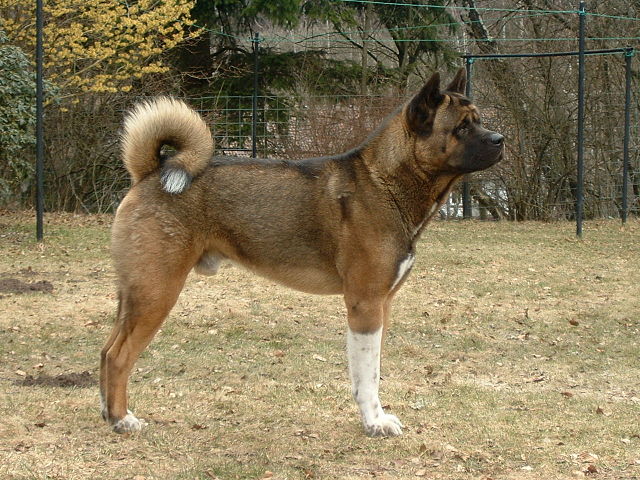The Akita is one of the largest and most powerful spitz breeds in existence today. With a temperament most often leaning towards natural dominance, they are not recommended for first-time dog owners. This breed is brave, independent and can be hard-headed but for experienced owners who know what they are doing, the Akita can be a companion like no other. Owners of these Japanese dogs like to say that under that harsh exterior is a loyal… occasionally silly, dog! Although independent, they do enjoy living inside with their families – this is not an outside-only dog!
Akitas are fairly athletic, making exercise an important task for owners. This said, the breed does not possess the “non-stop activity level” that certain other breeds have. Rather, Akitas have a medium energy level and medium requirement for exercise. In the house, they are generally calm.
They are a fairly quiet breed and do not tend to bark excessively, but they will protect your home – often stealthily. It is important to note that Akitas are very territorial and protective. They are not a watch dog… they are a natural guard dog. Some families acquire an Akita without realizing this fact, and then begin to realize that their dog is showing aggression towards friends and family who visit their house. This oftentimes results in the dog being dumped in the shelter or at a rescue organization. It is so important to realize that this breed must be socialized very extensively as young puppies, as well as receive structure and obedience training throughout their lives, so that they can differentiate “friend from foe”. As adults, well-socialized Akitas are often reserved around strangers but this is normal. Aggression is not.
As related to above, it should be noted that some home insurance companies will not cover you if own certain breeds. Furthermore, Breed Specific Legislation in certain areas of the country outright ban particular breeds of dogs. Akitas are sometimes on these lists. This does not make it right… but it is the law and worth looking into if you are thinking about adding an Akita to your family.
There are many Akitas competing across the country in all manner of dog performance events, so this breed is certainly trainable! However, training may be easy or hard depending on the dog’s individual personality and the trainer’s knowledge and skill. Some are easily motivated while others may seem to have no motivation for work. Stubbornness is a common trait. Most do not respond well to harsh training tactics nor – the other end of the spectrum – training that is too “soft”. The trainer must find the correct balance of “firm, yet fair” for each individual dog while also using the right motivation. To further complicate things… many Akitas get bored easily if the training becomes too repetitive! Nonetheless, training is absolutely vital in this breed. Many tend to be naturally dominant – some will go so far as to take direct eye contact as a challenge – so obedience training must be implemented early on and carried out consistently throughout the dog’s life!
When it comes to personality around their owners, some Akitas hate cuddling and are generally aloof. Others are more needy and can’t get enough rubs, scratches and attention. Fanciers of the breed like to say that each Akita comes with its very own unique personality! If you are looking for a specific temperament in your new puppy it is best to meet relatives of various litters in order to narrow your search down and find what you are looking for. With children, this breed absolutely must be raised with them if they are going to live with them. Some will tolerate kids from their own family but not from others. They are also not a breed that takes kindly to teasing of any kind, which children are sometimes apt to do. Kids should never be allowed to tease any dog – but especially not Akitas.
Many Akitas do not prefer the company of other dogs but there is variation in this trait as well. Some do just fine (and can even be playful) with other dogs. Most males will not get along with other males and females do not “play nice” with other females. Opposite sex interactions generally have better outcomes. With smaller pets, the Akita does not have the greatest track history. Because of their high hunting drive, cats and other small animals are often thought of as prey.
Although their coat is fairly short… Akitas have a lot of it! As such, expect a little bit of shedding year round and a LOT of shedding every few months or so (the breed sheds seasonally). Keeping the coat combed out on a regular basis will definitely help (as will regular bathing), but either way expect to be doing a lot of vacuuming!
As with all breeds (and mixes), health problems are always a possibility. Conditions that are known to affect the Akita include allergy and skin issues, auto-immune deficiencies, hip dysplasia, PRA, and bloat. Buying your dog from a responsible breeder who runs health tests on all dogs can help your chances of getting a healthy dog (although there is never a 100% guarantee – as with any dog). Overall, it is important to do your homework before you add an Akita to your family. For those who have the experience and knowledge, however, this breed can bring a lot of joy! If you have an Akita and are looking for a dog trainer in Austin or the surrounding areas, call us today!

Photo By Caro108
